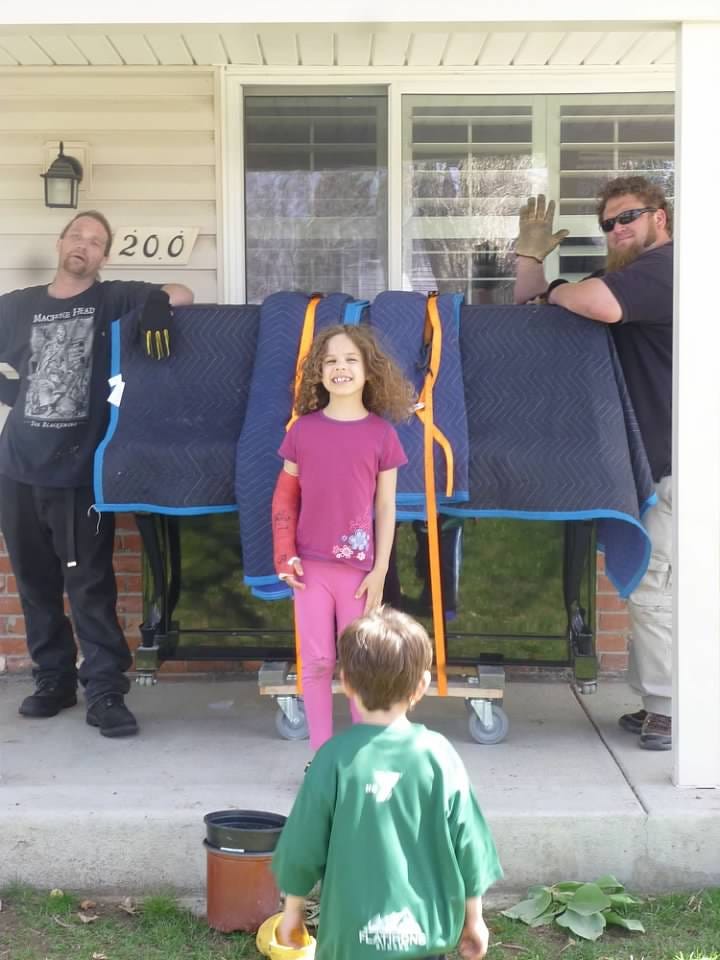Having a Monday: What I Learned from Being a Mom about Nurturing Creativity in Other People
The "no quit" rule that builds the requisite discipline for artistry, a new novel I loved, and literary activity galore.
I recently taught a class at Lighthouse Writers Workshop about conveying emotion in writing, and I suggested to my students that they could achieve authenticity by showing their characters experiencing more than one emotion at the same time. Emotions so often arrive in bundles of contradictions. My example: my daughter graduates from high school this week, and I’m so proud of her, but also wistful as I contemplate her heading off to college. It’s one of those life moments that forces you to reflect on the years that just whirred by.
Before I had kids, I imagine I harbored a variety of ideas about the kind of parent I would be. And then I met my kids, and realized it would all be an act of improvisational juggling, with clashing temperaments, bills raining down, medical diagnoses coming in, and dinner needing to be ready on time every night, all of it best managed with zero expectations for the outcomes of my efforts. My friend, the brilliant writer and doctor Brian Volck, taught me his golden rule of parenting: “You are not in control.” But I always put my heart into it, and developed a term for my missteps, such as tragic birthday cake wrecks that still tasted pretty good: that’s a Mama Tried cake.
Mama Tried at everything, and some endeavors worked out better than others. Although I remain unqualified to write a parenting manual, I do have one idea about raising a human that worked out well enough that I will share it with you, dear Tumbleweed readers. I believe that every human being needs an outlet for creative expression. When they lack this outlet, that natural human urge toward creative expression can become channeled into all kinds of reckless and destructive impulses.
The problem is, most art forms require training and years of practice to become reasonably good at them, good enough so that when you feel the need to express yourself creatively, you’ll experience some satisfaction. Sticking with that training and practice requires discipline that takes years to develop. Most of us can’t develop discipline by ourselves, through sheer force of will (although some astonishing dandelions are able to). Most of us need some structure put into place for us to develop discipline. It can happen later in life—I work with adults all the time who want to write books but can’t force themselves through the daunting process, so I coach them on accountability techniques. But it’s better if you can learn this yourself, when you’re young.
My thought was this: I’d pick one piece of artistic training to give my kids, starting when they were very young. I’d support that training with my time and money and heart, and make a rule about it: no quitting until high school. When my daughter was five, a neighbor named Essa came by. She was a pianist who’d immigrated from Tashkent and trained at a Soviet conservatory, and she asked, “Would your daughter like piano lessons?” my daughter thought that sounded like a fantastic idea, and I agreed.
Every adult I’ve ever met who took piano lessons for a while said that they wished they hadn’t quit. So I was going to try something. I put the piano at the center of our lives and our home. I didn’t think the approach outlined in Battle Hymn of the Tiger Mother was right, to micromanage every single activity and class kids took (and especially not to discount the importance of arts and humanities in education). I would micromanage just one activity. I would give them total freedom to sample and quit any other pursuit. I would pay for piano lessons for my kids, encourage them to participate in recitals, and require them to practice almost daily.
Sometimes when they were little, the practice was only five or ten minutes a day. But it was non-negotiable. I’d carry my son to the piano bench, put his fingers on mine as I learned the piece myself. I’d play a recording of the song so he knew how it went. I’d annotate the sheet music with anything that helped him remember what how to play. Eventually, sitting limp at the piano becomes too boring and the kids will press the keys themselves. There were a few times over the years when the kids were frustrated enough that they wanted to quit. We switched teachers when my daughter was in fourth grade, to see if maybe it was just Soviet methods that were souring her on piano, and found a wonderful teacher with fifty years of experience in Carol Wickham-Revier. I was willing to pivot with my rule, but not budge.
I was yelled at. I weathered sheet-music-flinging objections. I had to haul little people around. But the no-quit rule is essential, because it’s the only practice that allows kids to experience the extreme ups and downs that accompany artistic pursuits, without bailing out when they hit one of those downs. Every time my daughter was frustrated, trying to work her way through a new piece, I told her, “You’re just having a Monday. Tomorrow will go better.”
Mondays can happen on any day of the week. You are required to go through them to reach those carefree Thursdays and Fridays when you feel like you know what you’re doing. Any great artistic success comes through spending at least 1/7 of your time in the grips of an awful Monday where you can’t make sense of anything or make any progress. There are days when I doodle in the margins of my notebook and can’t cough up a coherent word. But still you sit there at your desk, or at your piano bench, or at your easel, and experience the Monday. The only way to learn this is a natural feeling, part of the palette of life’s emotions, not a pain to flee from, is to feel it again and again.
I only enforced the no-quit rule until eighth grade because I wanted them to feel free to explore who they were and what they wanted to do in high school. Once the kids graduated from eighth grade, I told them, “That’s it. You choose if you want to continue now.” My son shifted to electric guitar, which suits his spirit better. My daughter decided piano was part of who she was, and who she’d always be.
After years during which fifty percent of my utterances were, “Let’s plan when you’ll practice piano today,” I haven’t had to tell either of them to practice their instruments in years. They set their own goals, and make their way to their instruments. Though sometimes they clash when one wants to start practice when the other one wants to go to bed. And last week my daughter played her senior recital, mastering six gorgeous pieces so well that when I tried to share the video of her playing “Gymnopedie” by Erik Satie and “June/Barcarolle” by Tchaikovsky, Facebook flagged them for copyright violations because its A.I. judged parts of them too similar to certain professional pianists’ recordings.
Creating a a channel for artistic expression is a long game. But once you’ve built it, you get to keep it for life. My kids can go for weeks without playing, but now it will always be there for them, the training they had once, the facility they’ve developed, their ability to take their sadness or their anger and play a song about it, just like I might write a story about it. Then the bad feelings can dissipate into the beauty of something we have made.
There. That’s it. That’s all I know about parenting. Now I’m going to sit at my desk and have myself a Monday.
The Assorted Whimsy Portion of The Tumbleweed
Since the last Tumbleweed rolled into your inboxes, the greatest Wordle ever created happened:
I made my first guess, looked at the letters and thought, could it possibly be? Should I waste a vanity guess just in case it is? You know I did. Several of my friends texted to congratulate me that day. Alas, being featured in the Wordle does not come with a cash prize.
The Book Recommendation Portion of The Tumbleweed
I have been a fan of Miranda July since I watched her first movie, “Me and You and Everyone You Know.” My admiration continued when I got to review her first story collection No One Belongs Here More Than You for the Rocky Mountain News (the review has disappeared into internet hades but I copied it to Goodreads), and I suggested it as a “Feel-Good Short Story Collection” for the the Barnes & Noble blog. July’s new novel, All Fours, is probably my favorite of all her creative output yet. I got to review it for the Minneapolis Star Tribune, where I wrote:
“Girls who grew up in the '80s passing around Judy Blume's "Are You There, God? It's Me, Margaret," now midlife women, should share "All Fours" for its attention to many of the same questions: What's going to happen to me? What should I do about it? What does it all mean?”
I am already passing this book to several of my friends.
The Happenings & Links Portion of The Tumbleweed
I am looking forward to participating in the fourth installment of Reading Den on Wednesday, May 29 at 7 p.m. Also reading will be debut author Charlee Dyroff from her novel Loneliness and Company, two-time New York Times editors’ choice novelist Hermione Hoby, and Benjamin Kunkel, novelist and co-founder of N+1. Free registration is encouraged. Come on through and say hello!
Lighthouse Writers Workshop’s Lit Fest begins June 7, and you can register now for all the great classes and readings. I’m teaching four classes and I’d love to see you there!
Getting Published: Stories, Essays, Articles and Books, Friday June 7, 9-11 a.m.
Freelance Writing: Getting Started and Building Your Career, Friday, June 7, 1:30-3:30 p.m.
The Devil Made Me Do It: Using Folktale Forms to Structure Your Writing, Thursday, June 13, 4-6 pm.
Two-Faced: The Art of Multiple Perspectives, Friday, June 14, 1:30-3:30 p.m. (This one is currently sold out, but if you add yourself to the waitlist, they will likely move it to a bigger room!)
I'll also be participating on this lunchtime business panel:
Contests, Residencies, and More: Ways to Get Out There, Sunday, June 9, 12-1 p.m.
And I’ll be reading in celebration of the release of a new anthology with an essay of mine in it:
Anthology Release: We Can See Into Another Place: Mile-High Writers on Social Justice, Saturday, June 8, 5:30 p.m.
Have you written a short story collection? If so, why not enter it in the prestigious Flannery O’Connor Award for Short Fiction? I am honored to serve as one of the judges this year, reading through entries to pick some fabulous ones for series editor Lori Ostlund to consider. The contest runs from April 1 to May 31 and all entries are judged without author-identifying info attached. Give it a try!
As always, The Tumbleweed welcomes your questions and comments about writing, reading, taco eating, the Denver Nuggets, rabbit wrangling, Deion Sanders, and baby seals.




Appreciated this short Tumbleweed story of a truly lived motherhood experience, the more poignant now with your daughter's graduating high school. Wish someone had structured in a "no quit" rule for me when I was a kid; self-management -- with writing discipline a great example -- remains a challenge. ~~ rm